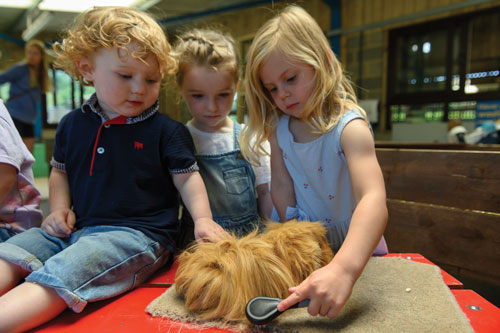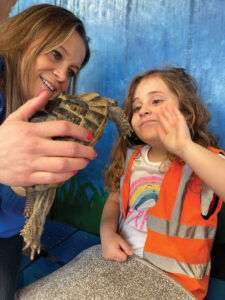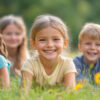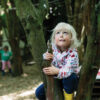
by Nicola Henderson
Godstone Farm
For many of us, our first friends in life might be a sibling or cousins, but more often than not, it is a furry friend in the form of a family pet. A dog, cat or even a pet fish can teach children so much about caring for others, helping young children learn to express empathy for another soul and understanding the responsibilities required to look after an animal. This is the core principle behind the ethos of many family farm attractions across the UK and accounts for the demand from parents for their children to attend farm-based nurseries and preschools too.
Typically, farm parks and farm-based nurseries are an ideal way for children to learn about how to care for a huge variety of animals – quite literally ‘all creatures great and small’ in a safe way. Many childcare experts have extolled the benefits of sensory play, but in many respects, learning to interact with animals is the original sensory play. For young children who are interested in, and emotionally invested in animals, it can also be a highly effective learning ‘tool’. Utilising things that drive learning and follow a child’s interests can really fast-track a child’s learning and can be much more effective than a prescribed curriculum.
Today, a number of family farm attractions now offer one-to-one hands-on animal experiences from goat herding to meerkat feeding, to help small children learn about the needs of animals, whilst farm based nurseries make daily visits to the animals’ pens, ponds, sties or hutches. Animal encounters are a fantastic way to provoke all-important curiosity, and illicit conversations about a variety of scenarios and new vocabulary to small children. When it comes to emotional development especially, the role of animals positively correlates with feelings of importance, social competence, and self-esteem. When children learn to care for animals they also learn that treating them nicely and patiently is an invaluable experience in learning to treat people the same way. Animals teach kids about patience and self-control, animals don’t always behave the way we want them to be. Animals can get over excited, scared and bite or peck but learning how to deal with these behaviours teaches children to be patient and have self-control. Children learn to have soft but firm voices and how to be gentle and careful. Animals have proved to be incredibly therapeutic for the children and can reduce stress and anxiety. It’s also recognised that animals give children an understanding of our natural world and how we can look after it. Looking after wildlife’s habitats such as building hedgehog houses or bug hotels, supports complementary discussion about recycling and being resourceful.
 Animals also provide children with lessons about life (reproduction, birth, illnesses, accidents, death, and bereavement). Children have the opportunity to see lambs being born and eggs hatching. Animals provide knowledge in biology. When children spend time around the different animals they begin to understand basic biology and how that translates between animal species. Activities like grooming animals and feeding them, understanding what they eat and how food is digested, develops children’s knowledge and of course, children love discussing poo!
Animals also provide children with lessons about life (reproduction, birth, illnesses, accidents, death, and bereavement). Children have the opportunity to see lambs being born and eggs hatching. Animals provide knowledge in biology. When children spend time around the different animals they begin to understand basic biology and how that translates between animal species. Activities like grooming animals and feeding them, understanding what they eat and how food is digested, develops children’s knowledge and of course, children love discussing poo!
Indeed, ask any farmer and they will tell you that they are always busy! Animals create a constant stream of jobs; day in day out, there is something to be done. Rain or shine, from season to season, dawn until dusk, there are animal caring tasks which children can get involved in. With the support of experienced enthusiastic practitioners, children are often excited and look forward to new and alternative experiences that come from time spent with farm animals.
Obviously, a key part of any animal experience is to ensure children feel secure and confident. A cheeky piglet or an inquisitive pony can create opportunities for children to challenge themselves and experience careful risk taking in a positive way. A landmark study by Williams-Siegfredsen (2011) believed that, if children were not exposed to risk, they were denied the opportunity to learn to address everyday challenges and problems. Moreover, the Health and Safety Executive argued that ‘the goal is not to eliminate risk, but to weigh up the risks and benefits. No child will learn about risk if they are wrapped in cotton wool!’ (HSE, 2012, p.1).
Risky play is seen as an important element in animal experiences and naturally, animals can sometimes be unpredictable. In this instance, young children learn about keeping safe when handling and feeding and are taught about infection control measures, how to use equipment safely such as closing gates, how to brush a horse or move around animals safely. As evidenced from a number of Early Years studies, children need personal contact with real animate people and creatures before play can become rich and satisfying (White, 2011).
Godstone Farm in Surrey offers a wider range of animal experiences allowing children (and adults) the chance to go behind the scenes and experience the many benefits of animal contact. www.godstonefarm.co.uk











